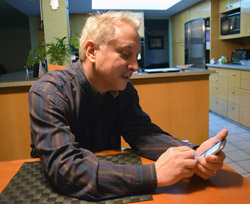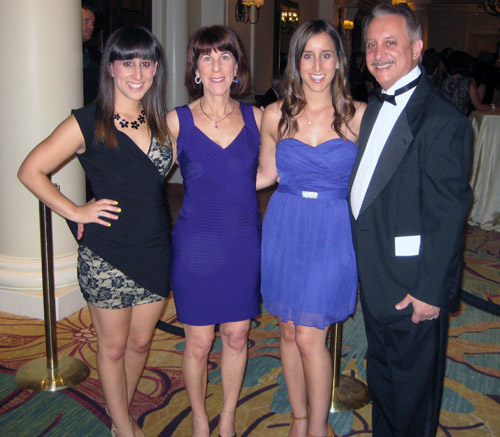By Donald H. Harrison


SAN DIEGO – Norm Katz is a conversationalist who can speak with insight about a great number of fields, including the government’s use of microfiche; diseases of the retina; how to detect submarines while they are under water; data jukeboxes; police communications; retirement funds; credit card theft; genome sequencing; and ways companies can keep accounts payable up to date.
In a bygone era, we might have called Norm a “Renaissance man,” but today he is more accurately described as a computer software engineer. After he was graduated in 1985 with a bachelor’s degree in computer science from Temple University in Philadelphia, he headed to California, knowing that the Golden State had plenty of jobs for people with his skills. The list of subjects above indicate just some of the projects for which he wrote computer code.
“When you have knowledge of software I think the sky is the limit,” Norm reflected in a recent interview. “You can travel, you always have marketable skills. When other people are worried about layoffs, even if you are laid off, you don’t have to worry. You can always find another job. Software is something that in the United States always is going to be in demand.”
Among Norm’s work-related travel experiences were five trips to Japan.
“I didn’t get to see much of the country but I got to see Tokyo and its surrounding communities. I got to eat fish that was still alive while you are eating it – that was an experience. It’s a certain kind of fish, kind of like a red snapper, but it is real small, and they put it on a skewer and stand it up, and its tail is still wiggling. They open it up and you just eat the meat right out of the fish—which isn’t kosher by the way. Animals are supposed to be dead when you eat them, but you only live once! It was really good. I also ate a lot of sushi, had a lot of sake, and I met some really nice people.”
Over a 30-year career, Norm has risen from software engineer to a project manager and he currently is a vice president of engineering for a start-up company called Revenue Masters, which produces “a really cool product to help hospitals to manage the bills that they are sending to insurance companies but not being paid in a timely manner.”
As an executive at this and former companies, he said, “I have tried to treat all my engineers with respect and give them opportunities to do their own estimates and trust them that they will get the work done. I have always gotten positive feedback from the people who have worked for me.”
As a conversationalist, Norm happily will discuss a wide range of other non-work subjects including the mechanics of stick ball, which he used to play in the alley behind his home as a child growing up in Philadelphia, as well as an innovative game called “box” hockey in which checkers were used as pucks and tongue depressors as hockey sticks. He also remembers working on a replica of the Mercury space capsule as a student at a magnet high school.
He also can relate his experiences as a young boy learning all about food preparation after his father Louis opened Lou’s Luncheonette in Philadelphia. That background is one of the reasons that Norm is so at home at Tifereth Israel Synagogue’s kitchen.
Norm spent a lot of time during his youth at Ner Zedek Synagogue, which he described as a “pretty big shul, with lots of families and lots of participation.”
“We had a very involved junior congregation so on Shabbat mornings we would fill up the chapel to overflowing, and it was a much larger chapel than Tifereth has. And the kids took charge of the whole service. It was from 18 down, with no supervision; all basically lay-supervised by the kids. We had a board of directors for the junior congregation, and officers, and I think I was president at one point.”
Norm, who later in life would become a ritual vice president at Tifereth Israel Synagogue, and then an executive vice president, said about his pre-teen and teen years. “I loved shul. I looked forward to going because my friends were there and I learned how to daven Shacharit when I was 11 years old. I could lead the service, but I wasn’t reading Torah then.”
He was able to read Torah in time for his bar mitzvah, but he let the skill lapse. “I promised myself I would again, so when my (twin) daughters were preparing for b’not mitzvah, I said I want to do a Torah portion and they were okay with that. Cantor (Alisa) Pomerantz-Boro gave a class on how to read trop and I took the class and excelled at it. She invited me to be part of the minyan. So I read Torah on Mondays and Thursdays one week a month.”
Today as Chair of Tifereth Israel Synagogue’s Men’s Club Religious Action Committee, Norm leads numerous activities, most recently the successful World Wide Wrap on Sunday morning, Feb. 7, at which Sofer Alberto Attia lectured about the symbolism and construction of tefillin.

Norm remembers the date that he met his wife Roxanne—June 7, 1986—which coincidentally was a year to the day after he arrived in San Diego. That evening he had gone to a Jewish singles wine tasting event in Temecula, and a friend he met there suggested they go later that evening to another singles get-together at a San Diego bar, where there was music and dancing. “He introduced me to Roxanne and we hit it off and we started dating.”
On their first date Roxanne and Norm went to the open air theatre at San Diego State University for a concert featuring jazz pianist Chick Correa and flamenco guitarist Paco de Lucia. “On the way home we stopped at Jake’s on the Beach, and then walked on the beach, and hit it off, and that really worked out well.” After dating five months, “we kind of knew we wanted to be together. We got engaged within a year.”
While Roxanne appreciated the romance and Norm’s obvious interest in her, she said what sealed the deal was that compared to other guys she had been dating “I felt he had his head screwed on straight. I felt like he was going somewhere. He had direction. He was focused, career-oriented, and that interested me.”
Their twin daughters Shannah and Nicki “are our pride and joy,” Norm commented. “Shannah is a graduate of Long Beach State. She works for a company that produces shows that are destined for online streaming through YouTube and Amazon. She is in the marketing and strategic planning office. Nicki is in West Hollywood, where she works as an assistant casting director on some films and TV shows, and a full casting director for some independent films. I think she has a really good eye for the appearance of someone, and what the director is looking for. Sometimes she can talk to someone on the phone and just know if someone will be right for the part.”
Reflecting on his life, Norm says “I’m a product of my upbringing and my environment. I think that it helps to have a good career, a good job, a nice house, but I think no matter how successful you are, it is important to give back to your community and be involved in it, not just writing a check, but taking on something. Tifereth Israel is my tzedakah, my way of saying I am helping my community. It gives me a reason to do things besides sleep and work.”
*
Harrison is editor of San Diego Jewish World. He may be contacted via donald.harrison@sdjewishworld.com . Comments intended for publication in the space below must be accompanied by the letter writer’s first and last name and by his/ her city and state of residence (city and country for those outside the U.S.).